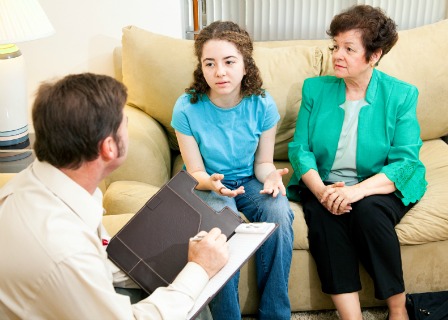
When a child’s life becomes complicated for any reason, it may be helpful to visit a licensed mental health counselor who specializes in family issues. Learn what kinds of situations may warrant extra assistance from a professional.
When kids need
extra guidance
Adults face a stigma around seeking help for mental health issues. The same often goes for kids. When it comes to their children, parents may hesitate to seek professional assistance and guidance for a number of reasons. Learn when some kids can benefit greatly from counseling and therapy.
Guide kids through major life events
Sometimes families are touched by events outside of parental control. Divorce, job loss, grief and conflict within the family are all issues that affect kids. As a parent, you may not know what to say or how to respond. If you’re struggling to find ways to comfort and console your child, consider seeking assistance from a therapist who specializes in children’s issues. Get a referral from your pediatrician, use your health insurance provider to find a specialist or talk to your child’s guidance counselor at school. This kind of therapy is often temporary but makes a huge impact on a child’s ability to deal with stressful, trying life events.
Listen to kids who ask for help
Children and teens may ask for help directly or may ask for help in indirect ways. Never brush off a child’s concerns or assume that he’s exaggerating. If your child or teen expresses an interest in talking to a medical professional or someone outside of the family about any sort of issue, become an advocate for your kid and make that happen. Try not to be insulted if your child would rather talk to a neutral party than talk to you. It isn’t a sign of bad parenting and it doesn’t mean that your child doesn’t trust you. You’ll always be the expert when it comes to raising your child, but there will always be occasions when a professional’s assistance is needed.
Learn about raising a sensitive child>>
Notice warning signs
Dr. Joseph Shrand, who works with at-risk teens at the High Point Treatment Center in New England, urges parents to follow their instincts and act on worries. “A ‘professional’ will let you know if your child could use some therapy, but they will never have that option if you don't bring the child in,” says Dr. Shrand, who suggests that parents look for warning signs like lack of interest in usual activities, school friends or hygiene. Isolation, sadness and irritability can also be warning signs. Regardless of age, Dr. Shrand suggests immediately seeking help for a child with suicidal thoughts or passive mentions of suicide. “Definitely [seek help] if they are even mentioning not wanting to live, whether they have a plan or not,” he says.
Get help finding the right therapist for your child>>
Help teens cope and heal
Teens are notoriously moody and may be withdrawn or anti-social by nature. During these difficult years, it may be harder to judge whether or not a child needs help. Be especially aware of issues surrounding body image, eating disorders or self-harm. If your teen shows signs of drug or alcohol use, remember that addiction can affect teens. Bullying and school stress may also affect a teen’s emotional well-being. If your tween or teen has previously been in therapy for mental health or developmental issues, keep in mind that as kids age, they’re faced with new and different challenges. Talk to your teen’s doctor if you’re concerned about your teen’s behavior in any way. If your teen asks to talk to a therapist, help her find someone she trusts and feels safe with.
More about your child's health
The 4 deadliest drugs teens are taking
Depression rates climb as girls enter the teen years
Does your teen have an eating disorder?